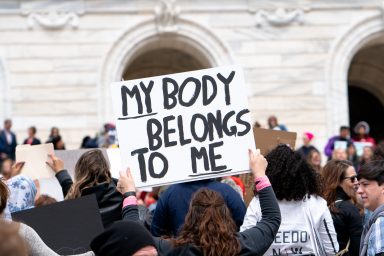During the midterms this year we focused on one of the most bizarre elections in the country. A race for governor where conflict of interest, voter suppression, and partisan shenanigans were just another day in Georgia.
|
Listen To This Story
|
The crown jewel of our work in 2018 was the coverage of Georgia’s midterm election. Early on, WhoWhatWhy realized that the gubernatorial race and the issue of voter suppression would be national news, so we dedicated unprecedented (for us) resources to shine a light on the status of voting rights in the Peach State.
We wanted to show the impact that voter suppression has on tight races, while not overlooking other problems in Georgia, such as the use of voting machines without a paper trail. In addition, we not only covered the policies implemented by Georgia’s politicians, but also put a human face on the consequences of these policies.
The entire project was a resounding success. Once again we identified a crucial issue before the rest of the media did. And some of the world’s largest news outlets were compelled to follow our lead and cite our work.
Below, you will find some of the highlights of our coverage:

Keeping Jim Crow Alive in Georgia With ‘Exact Match’
“Exact match” voter registration is a law enacted by the Republican-controlled Georgia state legislature; it carries on the infamous history of suppressing the African American vote in the Peach State.
.

Exclusive: High Rate of Absentee Ballot Rejection Reeks of Voter Suppression
A WhoWhatWhy investigation shows that a huge percentage of absentee ballots in a majority-minority county are getting rejected — and that at least some voters seem to be kept in the dark about it.
.

Exclusive: WhoWhatWhy Finds Voting Machines Unguarded
Shocking video shows voting machines sitting in an unlocked room in a public place in Georgia’s Fulton County the day before early voting started.
.

Propaganda or Foul Play? How Kemp and Abrams Supporters View Voter Suppression News
WhoWhatWhy attended recent campaign events for Georgia gubernatorial candidates Brian Kemp and Stacey Abrams. Talk about two different worldviews — and worlds!
.

Stunning Revelation: Georgia Counties Fail to Report Number of Rejected Ballots
A state lawyer reveals that not all counties report the ballots they reject to the state — misleading the public and making it nearly impossible to know the real scope of the problem.
.

Small County Bucks Kemp, Will Audit Midterms
Defying state officials, who are resisting all efforts to instill accountability into Georgia’s elections, one county — on its own — has decided to conduct a two-part audit of the midterms.
.

Asking Voters About Race: Helpful Tool or Roadmap for Suppression?
A small group of states, mostly in the South, have a question on their voter registration form about race/ethnicity. Why? And what effect does it have?
.

Exclusive: Georgia’s Voter Registration System Like ‘Open Bank Safe Door’
“Massive” vulnerabilities in Georgia’s online voter registration system have been discovered that allow anyone with minimal computer expertise to access and change the private information of Peach State voters and thereby compromise the upcoming midterm elections.
.

Kemp’s Aggressive Gambit to Distract From Election Security Crisis
Georgia Secretary of State Brian Kemp, battling in a close race to become governor, is pushing back against new reports of election vulnerabilities — uncovered by WhoWhatWhy — distracting the media and voters. He’s charging those who reported the danger with… being the danger.
.

‘Noncitizens’ in Georgia: Are They Really Trying to Vote?
Brian Kemp’s campaign says noncitizens are trying to vote. WhoWhatWhy examined his own data and it does not back him up.
.

Brian Kemp and His Staff Caught in a String of Falsehoods
In response to WhoWhatWhy’s exclusive story on vulnerabilities in Georgia’s voter registration system, Secretary of State Brian Kemp’s office has made unsubstantiated claims and omitted inconvenient truths about the security of that system. Here is new information on the risks.
.

79,784 Requested Mail-In Ballots Have Not Been Counted in Georgia
More than 79,700 people — that we know of — who tried to vote early by mail-in ballot have either not returned their mail-in ballot, had their ballot rejected, or had their ballot application rejected, and have not yet cast a vote.
.

Chaos, Lack of Transparency Mar Vote Count in Georgia
After 10 days of court battles and Gwinnett County Board of Elections and Registration meetings, vote counting draws to a close — but questions remain about who gets counted, and why.
.

Georgia Runoff Will Likely ‘Contaminate’ Voting Machines As Evidence
A WhoWhatWhy investigation shows that, for the last 16 years, Georgia has either been ignoring or misinterpreting one of its own rules on storing election data.
.

Georgia Lawsuit May Allow Rare Glimpse Into Its Elections
An election integrity group is challenging the results in Georgia’s race for lieutenant governor. If successful, the election will be re-run using a more secure voting system — paper ballots.
.

Will Kemp’s Successor Continue Georgia’s Voter Suppression Legacy?
Georgia’s Governor-elect Brian Kemp used his position as secretary of state to influence who gets to vote in his state. Next week, Georgia will decide who will follow in his footsteps and whether the mess he left behind will be cleaned up.
.

When Voter Suppression Goes Local…
In majority-minority Hancock County, Georgia, the local election board — dominated by white members — tried to disenfranchise many African American voters and almost got away with it. Where else is this happening?
.

Meet Georgia Veteran Worried His Vote Won’t Count
James Edwards is a veteran with mobility issues — so voting with an absentee ballot seemed natural. But he’s just one of many voters whose ballot was rejected for a reason that he believes isn’t right.
.

How Knowing Your Rights Can Stop Disenfranchisement
Two Georgia college students share their experience of voting for the first time — and their potential disenfranchisement had they not known better.




